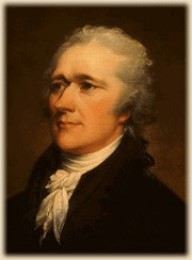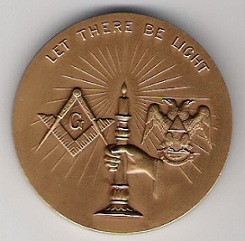
Jew or Not
Alexander Hamilton
architect of American capitalism
"Money is with propriety considered as the vital principle of the body politic; as that which sustains its life and motion, and enables it to perform its most essential functions."
[Hamilton. The Federalist No. 30]

Alexander Hamilton
architect of American capitalism
Hosted by robt.shepherd
by Michael Staib
Few people truly understand the unprecedented legacy of this prominent, passionate patriotic hero. Indeed, his conspicuous contributions to American democracy became overshadowed by the equally prodigious Thomas Jefferson. Yet, his direct ideological influence upon the venerable virtues of American constitutionalism sustains unsurpassed significance.
Likewise, Hamilton revolutionized the American economic system in a manner unlike anyone else throughout U.S. history. His pure, unadulterated genius became a preeminent allegorical archetype symbolizing economic nationalism. However, Hamilton never received the due recognition he deserved for these remarkable achievements.
Unfortunately, death culminated prematurely during an infamous duel with Aaron Burr at the pinnacle of his prospective political career. Consequently, barely witnessing the fulfillment of personal success, he died before his maximum potential truly materialized. A consummate crusader of political and economic freedom, Hamilton introduced capitalism to American society. Hence, Hamilton represents the quintessential architect of entrepreneurship in America.
Alexander Hamilton considered charity an indispensable priority. As a preeminent proponent of freedom, Hamilton promoted altruistic initiatives designed to ameliorate conditions for his fellow American brethren, and most particularly targeted destitute, downtrodden classes lacking equal opportunity. He references profound dedication to philanthropic interests through his abundant record of active civic engagement, establishing institutions that foster racial equality.
While slavery encompassed all races, it predominantly constituted Blacks. After all, slavery remained a pervasive problem during Hamilton's era of political prominence. For example, in 1785, Hamilton collaborated with others under his leadership to consolidate the New York Society for Promoting the Manumission of Slaves (Scanlan, 17).
Hamilton staunchly sought emancipation, and envisioned the inevitable termination of slavery during an era that condoned its virulent institution. Slavery became a polarizing issue that severely divided America during its infancy.
The dehumanizing institution and heinous hypocrisy surrounding slavery seemed unconscionable to Alexander Hamilton, as someone who championed individual liberty, inalienable rights of man, and freedom from personal oppression. Indeed, Hamilton advocated, "the abolition of Negro slavery," a measure which many Southern plantation owners considered probably "the most daring property invasions ever made," at that time (Miller, 122).
Therefore, recognizing the barbarous treatment of slaves, perceived as nothing more than mere property, Hamilton sought extensive social reform, specifically, substantial philanthropic initiatives that minimized slavery and provided emancipation. He continued these charitable interests throughout his life.
Most individuals who experience only half the success of Hamilton emerge from relatively wealthy families buttressed preponderantly by pampered financial assistance. Conversely, Hamilton received no such support. Rather, Alexander Hamilton originated from the "humblest beginnings," of any Founding Father, and yet whose eminence proved, "most startling" in a society still principally unaccustomed to high social mobility standards (Allen, 499).
Born the "second of two illegitimate sons," in Nevis, British West Indies, Hamilton witnessed unusual psychological trauma at a premature age (American National Biography Online, 1). While some historical discrepancies exist as to his date of birth, the evidence overwhelmingly suggests that it occurred in 1757, which Hamilton himself claimed.
A British subject comprising both Scottish and French Huguenot descent, his varied, diverse, multicultural heritage only heightens the personality dimension of this brilliant, versatile character (Lodge, 1). Alexander represents the son of a Scottish merchant, his father, James Alexander Hamilton (The Founder's Almanac, 1). His mother, Rachel Fawcette Levine, of French Huguenot descent, previously married a Danish proprietor in St. Croix, John Michael Levine, whom she divorced on June 25, 1759 (HamiltonBio, 1).
Despite her notable immaturity as exhibited by these deeply imprudent decisions, Rachel proved a uniquely erudite young woman possessing precocious intellectual inquisitiveness. As the daughter of a "Nevis doctor-planter," her sophistication became evident (Columbia Encyclopedia, 1). For example, she cultivated multilingual dexterity, "mastering English, French, and Latin," alongside acquiring an aesthetic appreciation for creative endeavors, such as music, "learning to play the piano, sing, dance," including skills in, "embroidery, painting with water colors," etc. (Schachner, 5).
Thus, the dominant maternal influence of Rachel, vehemently impassioned to learn and assimilate new knowledge, proved an invaluable quality, which she most likely bestowed for her son Hamilton, who subsequently developed this same voracious intellectual drive. Alexander's early education derives mainly from his mother (Historic Valley Forge, 1).
When Rachel died, she left behind, "thirty four books," for her son, Hamilton which he perhaps used subsequently to supplement his own education (Cavendish, 1). Indeed, Hamilton inherited, "only books, a library," particularly its own grandiloquent collection of, "stories portraying great statesman from ancient Greece and Rome," (PBS, 1). Among them included the renowned Roman scholars such as "Livy and Plutarch," who became "his inspiration," (PBS, 1).
Though the St. Croix court restricted remarriage, Rachel married James Hamilton in Nevis, where marriage remained legally permissible (Historic Valley Forge, 1). Nonetheless, the marriage failed. In 1766, with Alexander at age 10, James Hamilton abandoned the family, leaving his wife and two sons in St. Croix while he returned to St. Kitts (U.S. National Archives, 1). Hamilton's mother, Rachel died almost three years later after contracting a severe case of yellow fever (PBS, 1). Consequently, by age 12, Hamilton remained essentially alone as an orphan alongside his brother (Scanlon, 2).
Nevertheless, notwithstanding these formidable obstacles, Hamilton persevered. Ironically, the overwhelming adversity he encountered proved another profoundly positive psychological impact, precipitating the voracious motivational drive and subsequent success derived from his personality. Rather than falter, he became immediately self-reliant.
Hamilton progressively molded himself into the colossus monumental hero forever remembered by contemporary Americans. Indeed, Hamilton's "bold assertiveness," indefatigable determination, and genuine "genius" partially "reflect the byproduct of, "pathological compensation," to compromise for a severely underprivileged childhood (Schachner, 2). Through perseverance, Hamilton overcame his deplorably destitute childhood environment, transcending personal tribulations, and eventually emerged to become an affluent, aristocratic leader. He remained inevitably destined to flourish.
Hamilton's experience as a merchant proved perhaps the most significant psychological impact upon him during his childhood. At age 12, after Rachel died, he continued his work in a counting room as she intended for him (Lodge, 2). The industrious boy superseded his impoverished circumstance and supported himself, serving as clerk at a mercantile establishment located in Christiansted, "whose proprietor became one of Hamilton's benefactors," (U.S. National Archives, 1).
Apprenticed to a firm of "international merchants," proving "gifted in commerce," he soon became its manager (American National Biography Online, 1). Hamilton immediately learned the value of perseverance. Here, he cultivated his true taste for the meritocratic virtues, which define capitalism, a system that rewards individuals sufficiently determined to persevere. These values subsequently reinforced his regard for capitalism, and the unprecedented equal opportunity it provides, as fundamental to democracy.
At fourteen, recognizing his, "brilliance with numbers and strong work ethic," Nicholas Cruger, an affluent businessman, promoted Hamilton as manager, delegated responsibilities that included, "charting ship's courses, tracking freight, converting currencies, keeping books," among other miscellaneous tasks (Scanlan, 2). During this time, Hamilton earned a prominent reputation composing compendious articles in Caribbean Newspapers, which facilitated his subsequent success writing for New York pamphleteers (Wood, 1).
By now, Hamilton expressed a "strong desire" to attend college, which his aunts recognized, generously, "scrimping and saving," for him (Historic Valley Forge, 1). Their support, combined with the assistance of others, facilitated his arrival to New York and admission into a prestigious educational program. The incandescence he exemplified as clerk led both, "his boss and a local clergyman," to collaborate in sponsoring formal education for Hamilton (PBS, 1).
At age 15, a local Presbyterian minister discovered Hamilton and arranged to financially accommodate his admission into Princeton (American National Biography Online, 1). Noticing this "fiercely ambitious," prodigious, acutely intelligent young man who possessed striking precocious "abilities," mature and wise well beyond his years, minister Hugh Knox, endorsed Hamilton, collecting money from St. Croix's wealthiest men, to fund an education for him (Cavendish, 1).
Likewise, Cruger, recognizing Hamilton's genius, sponsored his formal education, though with the intent that he reciprocate, eventually return to St. Croix and manage Cruger's business (Scalan, 1). However, he never returned the favor. Nevertheless, in 1773, under the guiding tutelage of Cruger, Knox, and others, Hamilton received admission into King's College, or Columbia University as contemporarily known, within New York City (U.S. National Archives, 1).
As aforementioned, Alexander Hamilton mostly remained a "self educated" individual who then received formal education through private investment by numerous affluent merchants (PBS, 1). However, after the American Revolution, Hamilton returned to King's College and resumed his legal education. Hamilton wasted no time and prepared extensively, with profound intensity.
For ten months into 1782, with unrelenting tenacity, he trained himself to practice, passing the "rigorous New York State Bar Examination," that October (American National Biography Online, 1-2). Again, Hamilton's superior intellectual aptitude and pure unadulterated genius prevailed as he passed the NY bar merely, "six months after resuming his studies," (Allen, 503). Thereafter, he practiced law in New York City, and became a member of the Continental Congress (Bartleby, 1).
His formal legal education proved paramount to his subsequent prominence in both politics and private enterprise. Perhaps more than anything, the voluminous knowledge he acquired from his fertile legal education holds monumental historical significance, since it directly influenced national sovereignty.
If not for his legal education, where Hamilton derived such sophisticated understanding of law as an institution, the strong federalist constitutional values, which he incorporated, and active contribution toward its establishment, may not exist today. Without Hamilton, the U.S. Constitution as we know it ceases to exist. Likewise, modern capitalism as we know it today might not exist, along with the numerous other unsurpassed institutions he designed.
During the American Revolution, prior to his legal education, Hamilton founded a volunteer military company, and on March 14, 1776, received commission as Captain of New York Artillery Company (Historic Valley Forge, 1). As advisor to General George Washington, his innovative "military design," reporting "defects," and discussing artillery reform, Hamilton immediately demonstrated a distinct entrepreneurial drive (Historic Valley Forge, 1). However, his professional career escalated after he earned membership to the NY bar (PBS, 1).
A self-made entrepreneur and distinguished lawyer, Hamilton harnessed the formidable knowledge derived from formal education to institute his own independent legal practice, and subsequently, several other prestigious institutions. In 1783, he established his New York City law office (U.S. National Archives, 1).
A compelling communicator, Hamilton rapidly emerged to become, "the preeminent lawyer in New York City," as he articulated with genuine grace and grandiloquence, pontificating sometimes, "for hours," presenting extemporaneous speeches, organized into, "perfectly formed paragraphs," (Allen, 503). Hamilton quickly rose to superior rank "among the lawyers in New York City," as elucidated by his "most important early case," Rutgers v. Waddington, 1784 (American National Biography Online, 2).
In Rutgers v. Waddington, Hamilton defended his client against the Trespass Act statute, challenging it as a state constitutional violation. Ultimately, this "landmark case" holds a significant "place in the legal and constitutional history of New York," establishing its precedent for judicial review (Goebel Jr., 282-83).
In 1784, Hamilton established the Bank of New York, promulgating its constitution, serving as administrative, "director and attorney," (Allen, 503). He amassed exorbitant fortune from his entrepreneurial success. A testament to his conspicuous entrepreneurial achievement, the Bank of New York represents, "the oldest stock traded on the New York Stock Exchange," (Allen, 503).
Furthermore, considered, "the most prolific and influential pamphleteer of his generation," he produced countless colossal publications including the Federalist Papers, Hamilton's most notable contribution to constitutional doctrine (Allen, 499). Alexander Hamilton also promulgated his plan for a national bank, which Congress adopted.
The Bank of the U.S. combined both, "public and private ownership," with 1/5 of its stock owned by the federal government (Blackford, Kerr, 56). It served as a "general commercial bank," accepting deposits and offering loans to businesses (Blackford, Kerr, 56).
Hamilton sought to promote economic hypertrophy through the national bank, offering cumulative "capitalization . . . five times the size of all other commercial banks combined," (Brownlee, Elliot, 1). The Bank of the U.S. ranks among Hamilton's most noteworthy entrepreneurial successes, stimulating unprecedented economic development, and strengthening infrastructural development through private investment.
Hamilton epitomizes the Enlightenment philosophy of libertarian political thought. He advocated the utilitarian welfare of Americans, and considered his fellow citizens with highest regard. After all, Hamilton himself collaborated to consolidate the U.S. Constitution.
Hamilton championed capitalistic orientation as fundamental to the democratic principles of constitutional doctrine. Indeed, Hamilton recognized, "no real distinction between liberty and property," because he believed in his philosophy that without "secure property," freedom ceases to exist (Miller, 123).
Hamilton's exposure to the oppression imposed by a totalitarian British Monarch only reinforced this conviction, his democratic association with capitalism. To Hamilton, capitalism epitomized democracy in its quintessential form. He embraced the unprecedented equal opportunity of American wealth through capitalistic endeavor. Hamilton venerated its meritocratic elements.
Hamilton embodies the proverbial American dream. Overcoming personal tribulation, he emerged to prominence through his individual perseverance. Thus, Alexander Hamilton -- Constitutional framer and "architect of the U.S. financial system" -- valued perseverance as his personal philosophy, represented by American capitalism (Misani, 1).
Alexander Hamilton echoed Hobbes appreciation for money, writing: "In the present system of things the health of a state particularly a commercial one depends on a due quantity and regular circulation of Cash, as much as the health of an animal body depends upon the due quantity and regular circulation of the blood.
Bibliography
1. Scanlon, Laura Wolff, "Alexander Hamilton, The Man Who Modernized Money<" Humanities, Jan/Feb 2006, Vol. 27 Issue 1, p16-19, 4p
2. Miller, John C., Alexander Hamilton and the Growth of the New Nation, Harper Torchbooks, The University Library, Harper and Row Publishers, 1959
3. Allen, Brooke, "Alexander Hamilton: Enlightened Realist," Hudson Review, Autumn 2004, Vol. 57 Issue 3, p.497-508
4. McDonald, Forrest, "Hamilton, Alexander," American National Biography Online (registration required), Feb. 2000
5. Lodge, Henry Cabot, Alexander Hamilton - American Statesman, Houghton, Mifflin Co., 1898
6. Founder's Almanac, "Alexander Hamilton" - The Heritage Foundation, 2007
7. Hamilton Bio, "Alexander Hamilton"
8. The Columbia Encyclopedia, Sixth Edition, "Hamilton, Alexander," 2001-07
9. Schachner, Nathan, Alexander Hamilton, A Perpetua Book, A.S. Barnes & Company, Inc. New York, 1946
10. Historic Valley Forge, "Who Served Here? Major Alexander Hamilton," 1998-2008
11. Cavendish, Richard, "Birth of Alexander Hamilton," History Today, Article, January 2005, Vol. 55 Issue 1, p54-54, 3/4p, 1c
12. PBS Online American Experience, "Alexander Hamilton, People & Events," 5/8/07
13. U.S. National Archives, "The Founding Fathers: New York, Alexander Hamilton"
14. Wood, Lyle T., "Alexander Hamilton," Audiobookcafe, Articles, April 27, 2005
15. Goebel Jr., Julius, The Law Practice of Alexander Hamilton Documents and Commentary, Volume 1, Columbia Press, Library of Congress, 1964
16. Blackford, Mansel G., Kerr, Austin, K., Business Enterprise in American History Third Edition, Houghton Mifflin Company, Inc., 1994
17. Brownlee, Elliot, Hamilton's Economic Policies Dictionary of American History. Ed. Stanley I. Kutler. Vol.4 3rd ed. New York: Charles Scribner's Sons, 2003, 87-91, 10 vols. Gale Virtual Reference Library.
18. Misani, "Film Brings Story of Alexander to Life on PBS' American Experience," Entertainment Review, New York Amsterdam News, 5/17/2007, Vol. 98 Issue 21, p1-32, 2p
19. Gordon, John Steele, An Empire of Wealth : The Epic History of American Economic Power. HarperCollins, 2004.
Alexander Hamilton, original federalist and founding father of the U.S. Constitution, epitomized American wealth. Besides John Adams, Hamilton remains perhaps the most underestimated constitutional founder in American history.
Thomas Hobbes declared that money was "the blood of the commonwealth," and he explained why it was indispensable, like blood -- it "goes round about, nourishing, as it passeth, every part thereof." 
Thomas Sowell

Perplexities of Abolitionists and Other Friends - how Quakers (abolitionists) "played it safe" deserting blacks
Rivalries and Alliances, the women's movement and abolitionists intermittent relations
The Book that Taught America to Read - literacy for the lowly (in the heartland)
Abolitionist Frederick Douglass and Hillsdale College ("Citadel")
"All forms of Slavery are offensive to the human spirit be they Physical, Mental, Generational, or Economic. No one is better off under any of them. We must Emancipate ALL Americans and always remember our Abolitionist roots. Proud to march for the liberty of ALL Americans and to restore the opportunity society that made us once great! We all must work to redeem the dream of liberty and justice for ALL. We must all march to recapture the ideal of our Founders, the great promissory note that has been denied to some, for so long. We MUST never cease to pursue the Beloved Community. May God have mercy on America." |

Is Money 'DIRTY'?
Some Misc. Links

Out of Darkness the Light Hath Shined
Fiat Lux

|
We demand that big business give the people a square deal; in return we must insist that when any-
one engaged in big business honestly endeavors to do right he shall himself be given a square deal.
[President Theodore Roosevelt]
Bold Endeavors is a compelling narrative of ten large and transformative events in American history. It is an absorbing journey through the past as we read about determined national leaders -- Jefferson, Lincoln, Teddy Roosevelt, FDR, and Eisenhower -- who found the will, steadiness, and political acumen to make decisions that were often unpopular but that proved to be visionary -- decisions that are the building blocks of America's destiny.[ISBN : 9781416533122]Rohatyn begins with the diplomatic intrigues of the Louisiana Purchase, which doubled the size of the country; moves to the controversial construction of the Erie Canal, which opened a water route to the West; then continues to Lincoln's resolute support for the transcontinental railroad, Land Grant colleges, and the Homestead Act; documents the strategy -- and ruthless determination -- that built the Panama Canal; details the visionary and pragmatic politics that allowed FDR to bring electricity to rural America and use the Reconstruction Finance Act to help pull the country from the grip of the Depression; captures the foresight of national purpose which led to the G.I. Bill, which propelled the nation forward; and describes the creation of the interstate highway system that modernized America.
Bold Endeavors is an urgent call for present-day action in this time of grave national crisis. "The nation is falling apart -- literally," Rohatyn warns. "America's roads and bridges, schools and hospitals, airports and roadways, ports and dams, water lines and air control systems -- the country's entire infrastructure is rapidly and dangerously deteriorating."
To reverse this catastrophic degeneration and create tens of thousands of new jobs, Rohatyn offers a carefully reasoned and practical solution. Bold and imaginative political leadership must use the power and the resources of the federal government to finance the rebuilding of the nation's infrastructure.
Rohatyn's page-turning case studies are precedents for purposeful, resourceful, and tenacious leadership that is necessary to accomplish both the rebuilding of America and the country's emergence from its present financial crisis. These bold endeavors from the nation's past are instructive, a guide and an inspiration for Americans today. If the nation is to be rebuilt and its infrastructure renewed, if the country is to emerge from the present economic crisis and reclaim its position of unqualified strength and leadership in world affairs, then it must be guided by the vision, determination, and investments that originally helped create a secure and prosperous America.
Wealth is an important trust -- a stewardship

Jesus Walks
walking the walk

IS ~ talking the talk
Robert Shepherd
photograph